| |
|
Friday, May 9 Israel at 60 talk by Eyal Dagan
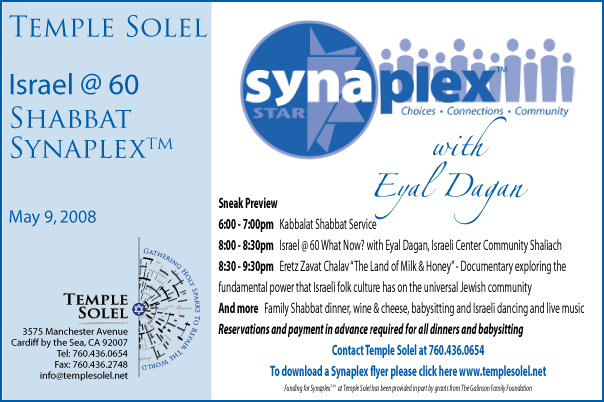
Saturday, May 17 Tifereth Israel Synagogue—Dizengoff Night
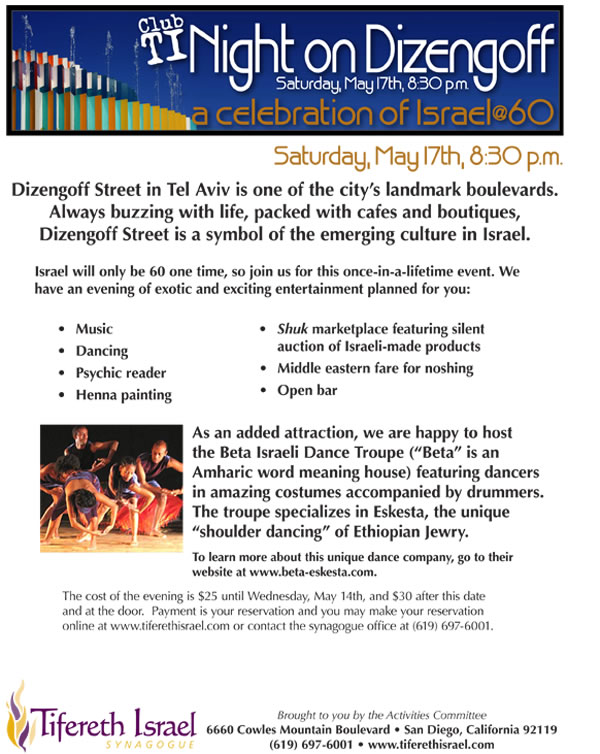
Sunday, May 18 Community Israel Independence CelebrationWednesday, May 28 JFS~Ellen Saks lecture on mental illness
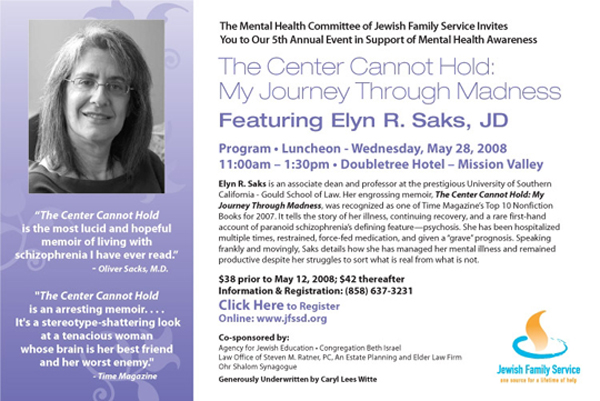
Tuesday, June 3 Guardians Golf & Tennis Tournament



THE JEWISH CITIZEN Yom Hazikaron
San Diegans and Israelis join in their grief for the casualties of war and of terror
By Donald H. Harrison
 SAN DIEGO—Israeli and American Jews jointly expressed their grief for the high price in young lives that Israel and its friends have had to pay to maintain the Jewish homeland in the Middle East. In song, instrumental performances, readings and symbolic ceremonials, more than 400 persons marked Yom HaZikaron—Israel's Memorial Day—at a service Tuesday evening at Congregation Beth Am. SAN DIEGO—Israeli and American Jews jointly expressed their grief for the high price in young lives that Israel and its friends have had to pay to maintain the Jewish homeland in the Middle East. In song, instrumental performances, readings and symbolic ceremonials, more than 400 persons marked Yom HaZikaron—Israel's Memorial Day—at a service Tuesday evening at Congregation Beth Am.
Starting wtih Ronit Levinson playing David Zehavi's Hebrew melody, "I Carry With Me," and ending with the entire assemblage singing Israel's National Anthem, "Hatikvah," the evening was heavy with sadness. One speaker, Nitzan Harel, struggled to not break down into tears during her eulogy to her high school classmate Arbel Raich, who was killed just last year during a retalliatory raid by the IDF in Gaza. "How do you comprehend a thing like that?" she asked in Hebrew, with her remarks later translated into English by Danielle Freedman. "We are only 21. We are not supposed to die—not yet." Now only her photos remain of the "blue-eyed boy who played his drums at this graduation." Once Harel exited the stage, she no longer could contain her grief, and her cries were heard throughout the sanctuary.
If others were more successful holding back their emotions, their pain was just as deep. Betty Erez told of her father, Abraham Moris Erez, who died before she was born--felled by an Arab sniper as he tried to raise a flag over Jaffa during Israel's War of Independence. Batya Noni told of her brother Emanuel Feinberg, who returned to his job in the tank corps in a subsequent war even before his wounds had heeled. His last words were "take care of my mom." When Batya had a baby girl, she named her Emanuel, even though that was ostensibly a boy's name, to at last bring a smile to her mother's lips.
And Linda Bennett, who lit a large candle in the mourners' behalf, didn't have to tell the San Diegans in the crowd why she was there. Most already knew that her daughter Marla had been among the students of Hebrew University who were killed in 2002 by a bomb in the cafeteria--and thereby became a symbol of the common purpose and peoplehood San Diego Jews feel with their Israeli cousins.
  
 
In addition to the personal stories of loss, the evening included readings of such works as "The Silver Platter" by Natan Alterman; "Save the World Child" by David Daor, and "Behold, Our Bodies are Laid Out," by Haim Guri. Host Rabbi David Kornberg chanted "El Male Rachamim," a traditional song of mourning, and Rabbi Rafael Goren of SCY High, an Orthodox institution, offered Yizkor prayers.
Ceremonies included lowering the Israeli flag to half staff and standing in silence for two minutes as a siren wailed for the dead. Speakers, after eulogizing their loved ones, solemnly lit small candles in their memory.
Participating groups and performers included the Ken Jewish Community, students of SCY High, the Beth Am Choir, Hillel, guitarist Elisheva Edelson, vocalist Cheri Sasson, pianist Dian Benaroya, flag attendant Mario Adato, and readers Sol Kempinski, Zeev Bar-Sheshet, Ariel B. Neikrug, Omer Katznelson, Michelle Bialas, Isaac Attia, Josh Milstein, Omri Aloni, Yehudit Halevy, Eitan Yaacobi, Justine Goldberg, Jay Bartell, and Jennie Starr.
Eyal Dagan, the community shaliach from Israel, offering summary remarks, commented that in Israel there is no home that does not share the sense of bereavement. He said the "whole nation is determined not to let our fate be determined by others ever again."
Israel has withstood, war, terrorism and threats, but at such a terrible price, Dagan sai. The soldiers who sacrificed their lives in battle and the civilians who lost their lives to terrorists, are Israel's heroes--their deaths an awful but necessary payment to keep Israel free.
Friday-Saturday, June 6-7 JFS~Judaism on the Wild Side

Im Tirtzu: Hold Fast to Dreams
By Cantor Kathy Robbins
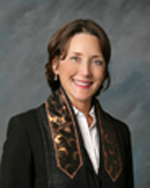 CARDIFF BY THE SEA, California—I am not a boxing fan, but I was moved by an interview I saw with Evander Holyfield. When he was a skinny child of eight or nine, a man told him he could be the heavyweight champion of the world someday. Knowing this sounded far-fetched, but also knowing that he could trust his mother to always tell him the truth, he asked her if he could be the heavyweight champion of the world. She said yes. He believed her. Holyfield told the interviewer that it was the power of this belief that propelled him to follow his dream. He took his dream in to the “quantum field,” the field of possibility and potential. CARDIFF BY THE SEA, California—I am not a boxing fan, but I was moved by an interview I saw with Evander Holyfield. When he was a skinny child of eight or nine, a man told him he could be the heavyweight champion of the world someday. Knowing this sounded far-fetched, but also knowing that he could trust his mother to always tell him the truth, he asked her if he could be the heavyweight champion of the world. She said yes. He believed her. Holyfield told the interviewer that it was the power of this belief that propelled him to follow his dream. He took his dream in to the “quantum field,” the field of possibility and potential.
Saul Chernichovsky’s poem “Sachaki,’ included in the Haggadah, is translated as “Laugh at all My Dreams.” You may know Debbie Friedman’s o Dan Nichols’ musical settings of the poem. The text reminds us that while it may be true that “man plans and God laughs,” we still have the power to dream and to work toward fulfilling those dreams.
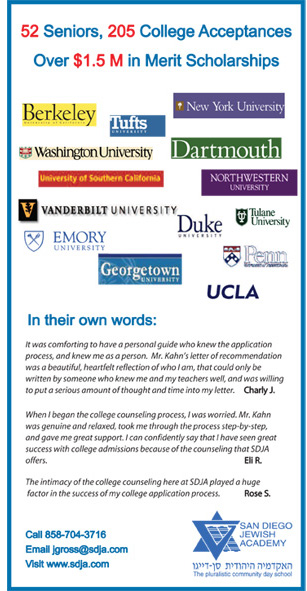 Also on the subject of dreams is Langston Hughes’ poem, “Hold Fast to dreams,” set to music by Cantor Jeff Klepper: Also on the subject of dreams is Langston Hughes’ poem, “Hold Fast to dreams,” set to music by Cantor Jeff Klepper:
Hold fast to dreams!
For if dreams die,
Life is a broken-winged bird that cannot fly
Hold fast to dreams!
For when dreams go,
Life is a barren field frozen with snow
This poem, included in the University of Massachusetts Freedom Seder, a multicultural, interfaith, interspiritual ceremony of unity, gives voice to the common desire for freedom from all forms of oppression.
By proclaiming, Im tirtzu, ein zo agada, “If you will it, it is not a dream,” Theodor Herzl, a secular Viennese, took his dream of a Jewish state into the “quantum field.” According to physicist Fred Alan Wolf, “Reality depends upon our choices of what and how we choose to observe. These choices, in turn depend upon our minds, or more specifically, the content of our thoughts.” Herzl’s vision became realized when England agreed, in the Balfour Declaration, to establish a Jewish homeland.” Within 50 years of Herzl’s call of the first Zionist conference in 1897, the State of Israel was born.
As we move from our Pesach season of liberation into our celebration of Israel at 60, let us support one another to actualize our dreams, whether communal or personal. Let us help one another to be God’s partners in the on-going act of creation, of tikkun olam.
.
Nancy Harrison
cruise & tour specialist
(619) 265-0808


JERUSALEM DIARIES
The anticipation of Yom HaZikaron
By Judy Lash Balint
 JERUSALEM—Flags are in place on every building, flagpole and many cars; the air force has been rehearsing its formation fly-by routine for days; platforms and lighting stand ready in the main squares in town; groupso f tourists mill about and there's a discernible festive air. But before we celebrate the nation's 60th anniversary,we have to pay tribute to the 22,437 Israelis who fell in the battles and terror attacks that continue to claim Jewish lives even until today. JERUSALEM—Flags are in place on every building, flagpole and many cars; the air force has been rehearsing its formation fly-by routine for days; platforms and lighting stand ready in the main squares in town; groupso f tourists mill about and there's a discernible festive air. But before we celebrate the nation's 60th anniversary,we have to pay tribute to the 22,437 Israelis who fell in the battles and terror attacks that continue to claim Jewish lives even until today.
Tonight (Wednesday) the country will come to a complete standstill at 8 p.m andagain tomorrow morning at 11 a.m for two minutes of remembrance of the fragility of our existence in the Jewish homeland.
Ceremonies at every military cemetery in the country will bring out thousands of mourners. Since the beginning of 2008, 16 people were killed and 65 wounded in terror attacks--mostly in the south.
Streets are empty--everyone is at home marking the somber evening. All places of entertainment, cafes and restaurants are closed. Authoritiesestimate that more than one million Israelis will visit the military
cemeteries over the next 24 hours.
But other events in the week leading up to Yom Haatzmaut have stolen the headlines--the new corruption allegations against Ehud Olmert, of course, but it was much more interesting to contemplate the 500kg
plate of hummous that measured 4 meters across that broke the Guiness world record for plate size and amount of hummous consumed in one go, or maybe it was the 140 new sabras born to N. American olim who arrived under the auspices of Nefesh B'Nefesh or the 400 new olim who arrived from 23 countries on Aliyah Day yesterday that preoccupied our attention.
In any event--on Thursday when Israelis finally get to celebrate Independence Day in the traditional fashion with BBQs, fireworks and a real day off,it will be with the usual mix of emotions that accompany
every holiday in the State of Israel--joy and sadness; appreciation and remembrance and above all, incredulity that we've made it to 60...

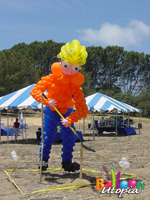 |
Balloon Utopia
Sandi Masori
619 339 8024
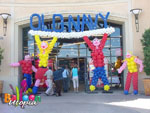 |
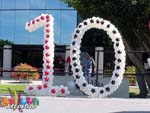
! |
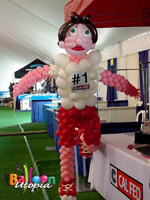 |



San Diego County Jewish Trivia Authors
Adapted from San Diego Trivia (1989) and San Diego Trivia 2 (1993)
{Editor’s Note: Retired librarian Evelyn Kooperman, a friend to the Jewish community, enjoys playing the cello and collecting trivia about her native city of San Diego. This column excerpts Jewish communal items from her two books, San Diego Trivia (1989) and San Diego Trivia 2 (1993). Readers should note that the information has not been updated since the books were published. Kooperman still has a limited supply of the two books, which cover the general San Diego community in all its aspects. Either of the two volumes sells for $5 and may be obtained by telephoning the author at (619) 461-6095.}
By Evelyn Kooperman
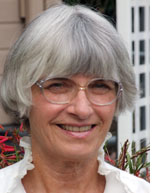 Q1. What Spring Valley psychiatrist wrote the 1969 best seller about sex? Q1. What Spring Valley psychiatrist wrote the 1969 best seller about sex?
Hints: His book was Everything You Wanted to Know About Sex, But Were Afraid to Ask. It was followed two years later by another seller in the millions, Any Woman Can!, and more recently by books on nutrition. He moved to the San Diego area around 1962 and practiced psychiatry in a Spring Valley office for many years. He had to cut down his practice, however, when he became a celebrity and popular guest on many TV talk talks shows.
Q2. What former San Diego author is known for his tall tale children’s books, including the stories of McBroom?
Hints: He moved to San Diego at about the age of two, and graduated from San Diego State College. He was a San Diego police reporter and feature writer before writing novels, screenplays and his popular children’s books, such as McBroom Tells a Lie, McBroom and the Beanstalk, The Ghost on Saturday Night, and 1968 Newbery Medal winner The Whipping Boy.
Click here for answers


ADVENTURES IN SAN DIEGO JEWISH HISTORY
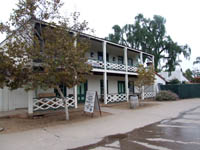
Robinson-Rose House
|
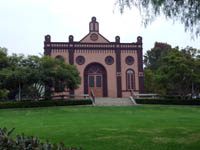
Old Temple Beth Israel |
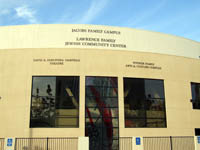
Lawrence Family JCC |
Editor's Note: We are reprinting news articles that the Southwestern Jewish Press ran in 1950. If you have historical topics about the San Diego Jewish community you would like us to explore, please e-mail your suggestions to editor Don Harrison at sdheritage@cox.net
An Evening of Enlightenment
From Southwestern Jewish Press, April 28, 1950, page 5:
By Maxwell Kaufman
The Scholia Society is comprised of a group of men chosen for their high character and scholarship. Members include some of San Diego’s best minds, intellectually and culturally.
I was invited to attend a recent meeting of this group, at which Rabbi Morton J. Cohn read a paper on the subject “Israel and the Arab Problem.” Rabbi Cohn gave a masterful presentation of the facts on the Arab problem in Israel. I sat back and waited for comments. Non-Jews, when discussing Jewish topic with Jews are usually reticent in saying what is really in their minds, either because they fear to offend or do not wish to be misunderstood. I can assure you that this was not the case here. It took Rabbi Cohn almost one hour to read his paper and everyone of the fourteen members was busy taking notes.
When the comments began, there were no criticisms, but questions were raised. Questions that indicated an utter lack of information on the modern State and its relationship to the Western World. They showed undue concern for the fate of the Arabs; some of them defended Britain’s position in the Palestinian struggle and rejected the criticism leveled at the part England was now playing in arming the Arabs.
Other questions asked were: “Why do the Jews want to set up another Nation instead of being scattered all over the world where they have made such fine citizens?”
“Does the ‘Jewish Race’ think its destiny is to get back to Palestine and spread its culture throughout the East?”
“What about redress to the Arabs?”
“Will the Jews play fair with them?”
“What will be done for the 400,000 Arab refugees?”
There was a reference to the Jews as parasites, moving in on the Arabs and swallowing them up, like plants in the jungle. One member made the shocking remark that “The American Jews may be building a Frankenstein in Israel, which may in time be the cause of the Catholics and the Protestants uniting and seeing that the Jews all go to Israel.” Fortunately, none of the others shared this dangerous and completely distorted point of view.
There was a great deal more said, but space limits me to the above reflections. What was most alarming about the reactions of these men of high caliber was their almost total lack of information regarding the Jews in America, Zionism, its history and goals, and Israel. Absent from the discussion were understanding, sympathy and objectivity. What was present were suspicion and distrust of our motives regarding Arabs and a deep-rooted conviction regarding the place of the Jews in the Christian World.
I am grateful to Rabbi Cohn for extending to me the privilege of “listening in.” I came away from the meeting convinced that the most glaring weakness in the entire Zionist movement has been its failure to obtain American mass-support through an intensive yet subtle program of education. A way must be found to disseminate more information about our point of view among the non-Jews. This should be a challenge to our various Zionist organizations, the Christian Committee for Palestine and the Community Relations Council.
The time for it is now! With the bitter controversy over the proposed internationalization of Jerusalem and the possibility of renewed warfare thrust upon little Israel by the rearming Arab states—it is later than we think!
Jewish War Veterans Post No. 185 and Auxiliary
From Southwestern Jewish Press, April 28, 1950, page 8
By David Brooks
In an impressive ceremony held April 17 at Temple Center, San Diego Post 185 of the Jewish War Veterans installed Harry G. Aranoff as commander of the organization, succeeding Manuel S. Fisher. The Post also installed Allan Lame, Sr. Vice Commander and J. David Books Jr., Vice Commander. Installing officer was Harry Apelman.
Other organizations, notably the American Legion, Disabled American veterans, Veterans of Foreign Wars, Spanish-American War Veterans, Order of the Purple Heart, and Catholic War Veterans attended the installation.
Mrs. Esther Levitt was installed as President of the Auxiliary, succeeding Mrs. Nixie Kern. Mrs. Ann Wager, Department of California Auxiliary President, was the installing officer. Past Department President, Jean Edelstein assisted in the ceremonies.
Training and Tradition of Family Giving
From Southwestern Jewish Press, May 12, 1950, page 1
One of the highlights of “Magic Carpet Day” (a door to door solicitation for UJF} was seeing the Rabinowitz family turn out en masse to help. There were Max and Mollie, Seymour and Janice Rabin, Herbert and Edith Reder, all pitching in as workers. Mollie and Max went out as buck privates and brought back the bacon (oops—pardon)—Salami. So did all the children.
The Rabinowitz family is also among the top givers in San Diego, and the tradition of giving is firmly established in their children. Here is what they gave this year:
Max Rabinowitz—$5,000
Mollie Rabinowitz—$500
Seymour Rabin—$1,000
Janice Rabin—$100
Herbert Reder—$400
Edith Reder—$100
and Dorothy (Rabinowitz) Arenson from Des Moines, Iowa—$200. The total contribution of the family was $7,300.
‘Magic Carpet Day’ Amusing Highlights
From Southwestern Jewish Press, May 12, 1950, page 1
Vic Shulman, president of the United Jewish Fund, but one of the buck privates on Magic Carpet Day came back and told the following story:
“I had six cards, two people were not in and the other four were either sick or broke. I had to leave more than I brought back.”
One worker called Mrrie Douglas to tell him that she couldn’t come because “she was having a baby.”
Another worker reported that one of his prospects was not home, as a matter of fact he was “in jail.”
Another brought back the story that his prospect (a Jew) was married to a Mormon girl and he had to give 10 percent of his earnings to the church.
And to top them all there was the story of the Jewish man, married to an Irish girl, who had a job with the Arabian Oil Co.
The meanest man in town was the one who came to the center, partook of the Jolly Sixteen Breakfast and then left without helping.
Al Slayen stayed home waiting for the Magic Carpet solicitor to call on him. The worker called on schedule and received Al’s pledge. As a result of the friendly conversation which ensued, Al received a sizeable order for an upholstery job from the Magic Carpet worker …. “Cast your bread upon the waters, etc. ..”
San Diego Jewish Trivia Answers: (1) Dr. David Reuben; (2) Sid Fleischman

SAN DIEGO JEWISH WORLD THE WEEK IN REVIEW
Donald H. Harrison in San Diego: Marketing Middle East peace through the products offered in Western supermarkets
Dov Burt Levy in Salem, Massachusetts: Comfort for the bereaved on Yom Hazikaron and year round: the gift of active memory
J. Zel Lurie in Delray Beach, Florida: Let us look at Israel‘s Declaration of Independence as its 60th birthday nears
Joel Moskowitz in La Jolla, California: A dybbuk that teaches righteousness
Adventures in San Diego Jewish History: What was the Jewish community news in 1950? Who were the newsmakers? Our archives answer these questions in daily installments
Cynthia Citron in Los Angeles: From Door to Door is a Dor v' Dor story
Donald H. Harrison in San Diego: There are no cushions in the Duvdevan
Sheila Orysiek in San Diego: What kind of dance accompanied Song of the Sea? We have some interesting clues
Ira Sharkansky in Jerusalem: Independence Week brings its tensions
Dorothea Shefer-Vanson in Jerusalem: Orphaned art looking for owners
Adventures in San Diego Jewish History: What was the Jewish community news in 1950? Archives of the Southwestern Jewish Press provide some of it.
Donald H. Harrison in San Diego: Terror survivors hosted at Beth Am
Rabbi Baruch Lederman in San Diego: When it's not as plain as the writing
Dov Burt Levy in Salem, Massachusetts: 'Smitten Zionist' tells of Israel love affair
Rabbi Leonard Rosenthal in San Diego: 'Can you love your neighbor as yourself?'
Gary Rotto in San Diego: After several toe-dips, Block takes the dive
Adventures in San Diego Jewish History: What was the Jewish community news in 1950? Archives of the Southwestern Jewish Press provide some of it.
Shoshana Bryen in Washington, D.C.: Kuwait-Syria connection; Iraq's cell phones
Carol Davis in San Diego: Backyard's dumbed-down female show
Donald H. Harrison in San Diego: Students, survivors jointly commemorate Shoah at San Diego Jewish Academy
Lloyd Levy in Eilat, Israel: Holidays of despair, struggle and salvation
Sheila Orysiek in San Diego: Chapter Six in the serialization of her novel, Reluctant Martyr
Adventures in San Diego Jewish History: What was the Jewish community news in 1950? Archives of the Southwestern Jewish Press provide some of it.
Yvonne Greenberg in San Diego: Catholic university honors a rabbi for her career pursuing social justice, tikkun olam
Ulla Hadar in Kibbutz Ruchama, Israel—Sha'ar Hanegev aids SDJA's Shoah project
Donald H. Harrison in Poway, California: $11,500 reward offered for capture of vandals of Ner Tamid Synagogue's marker
Vicki Raun in La Jolla, California: 'God was in the boxcars'—Lou Dunst
Hal Wingard in San Diego: Three songs: "Kindness," "Ruth's Song" and "Bar Mitzvah"
Adventures in San Diego Jewish History: What was the Jewish community news in 1950? Archives of the Southwestern Jewish Press provide some of it.
< BACK TO TOP
|
|
